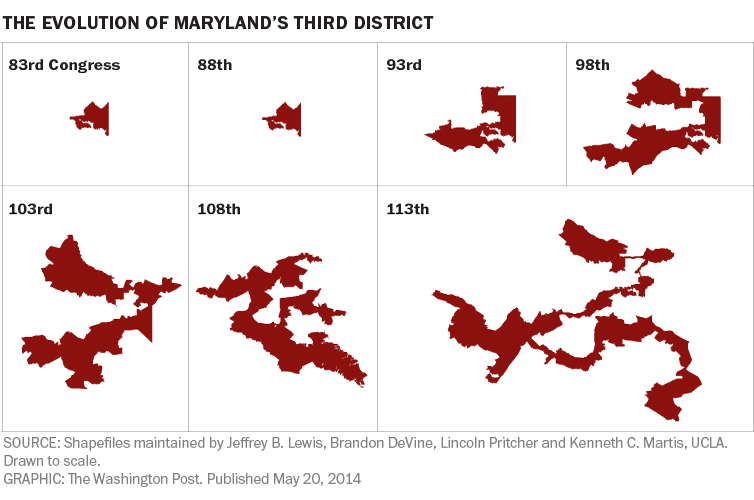
Last week I wrote about the most gerrymandered congressional districts in the United States, as measured by how geometrically compact they are. I found that districts in some states are a bit of a hot mess, particularly in North Carolina and Maryland. The natural follow-up question: have they always been that way?
To answer that, I grabbed historic district "shapefiles" and did the same geometric analysis for a handful of states, going back to the 83rd Congress, which convened in 1953. In nearly every state, the average gerrymander index value -- that is, the average of the gerrymander scores for all districts in a given state -- has risen substantially since then.
Here's a look at a handful of key states:
The rise has been most dramatic in Pennsylvania and Ohio -- presidential battleground states -- as well as Illinois. Maryland and North Carolina are the two most gerrymandered states today, and while their numbers have remained consistently high, they've also shifted upward since the 1950s.
There are a number of confounding factors to consider here. The number of seats allocated to each state has changed over time, and state populations have risen as well. In areas with denser populations, it's easier to come up with creative ways to draw districts.
But these states don't show any discernible relationships between population, the number of seats in a congressional district and the extent of gerrymandering. Pennsylvania and New York have lost congressional seats over time. But Pennsylvania's gerrymandering scores have risen steadily, while New York's peaked around the 98th Congress and have been declining ever since. Texas has nearly doubled its congressional representation since 1950, and its gerrymandering average spiked in the 103rd Congress, dipped in the 108th, and shot back up in the 113th. Maryland's number of districts has been relatively flat, and its gerrymander scores have fluctuated considerably.
What does all this mean? It means states can actually control the extent of gerrymandering. Take New York, for example. It's the one state among the eight that has shown a meaningful decrease in the level of gerrymandering across multiple congressional terms. New York also has also set up an independent advisory commission that recommends congressional and state redistricting plans to the state legislature. This commission was set up in 1978, and shortly thereafter the level of gerrymandering in the state peaked and has been declining ever since.
While the New York legislature is not bound to follow the advisory committee's recommendations, this does suggest that subjecting legislators to some oversight in the redistricting process could rein in their enthusiasm for rigging that process in their favor.
Some writers, notably John Sides at the Monkeycage and Seth Masket in the Pacific Standard, caution that there's more to the gerrymandering story than just compactness. Seth sums things up by noting that there are any number of factors by which districts can be assessed, including equal population size, absence of racial discrimination, compactness and contiguity of districts, preservation of county or municipal boundaries and preservation of communities of interest.
"Some of these goals run right up against each other," he writes. "While a compact district may be desirable, it doesn’t necessarily reflect how people live or what county and city boundaries look like." Or, as John succinctly puts it, "Representation is about people, not polygons."
I couldn't agree more. But in many states, if not most of them, districts have become consistently less and less compact over time. And it doesn't seem like these changes in compactness can be explained away by changes in population or overall seat allocation, which tells me that something else is happening in those states.
I have a hard time looking at the evolution of districts such as Maryland's 3rd (above) or Pennsylvania's 7th (below) and concluding that whatever's happening in there is the result of a healthy democratic process.
What's at stake, after all, is citizens' representation in Congress. Partisan gerrymandering undermines the whole notion of a representative government. For proof, just look toward the lopsided seat distribution in the current Congress.
3 WAYS TO SHOW YOUR SUPPORT
- Log in to post comments













